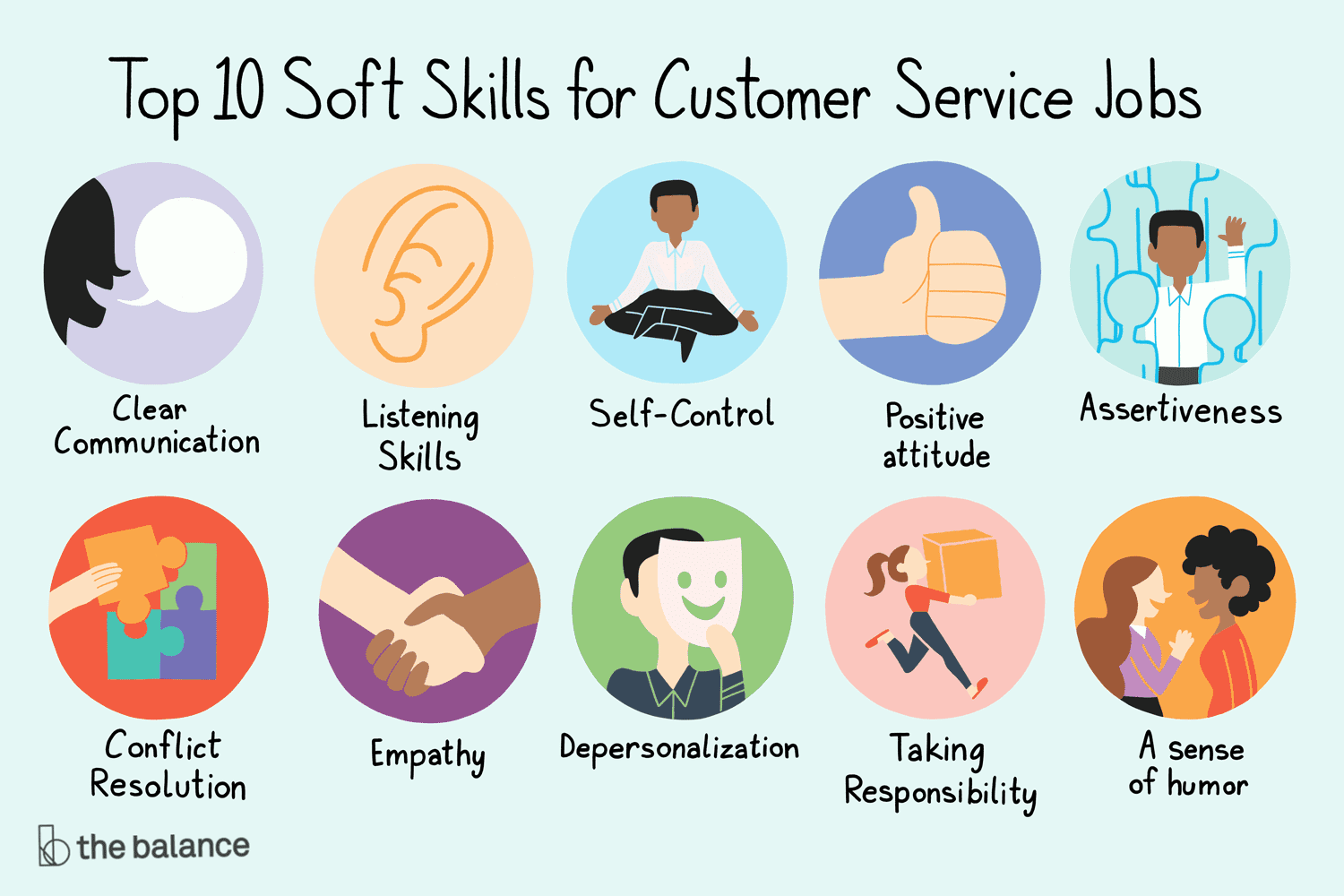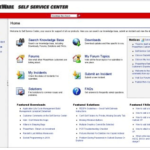The customer service industry requires employees to have a number of soft—or interpersonal—skills. Whether you interact with customers in person, on the phone, or via email or online chat, it’s important that you be able to relate to others on a human level. The customer should feel as if they are interacting with someone who genuinely cares and wants to solve their problem.
Developing these customer service skills and emphasizing them in a job interview can help you rise above the job market competition.
What Are Soft Skills?
Soft skills are the personal attributes, personality traits, inherent social cues, and communication abilities needed for success on the job.
Soft skills characterize how a person interacts in their relationships with others.
Unlike hard skills that are learned, soft skills are similar to emotions or insights that allow people to “read” others. These are much harder to learn, at least in a traditional classroom. They are also much harder to measure and evaluate.
Soft skills include attitude, communication, creative thinking, work ethic, teamwork, networking, decision making, positivity, time management, motivation, flexibility, problem-solving, critical thinking, and conflict resolution.
Hybrid skills are related to soft skills in that they include a combination of non-technical and technical skills.
Soft Skills You Need to Work in Customer Service
Emphasize these soft skills in your resume and cover letters. Come to job interviews prepared to discuss times when you used these important customer service skills.
1. Clear Communication
Clear communication is essential to customer service. You need to know what the customer wants and be able to articulate what you can do for the customer.
Enunciating, speaking loudly enough, and employing an upbeat tone will help you communicate clearly and positively with your customers.
These skills are essential in phone communication, as well. If you write or email with customers, be sure to use proper grammar and spelling and choose words and phrases that convey a similarly upbeat attitude.
- Verbal Communication
- Written Communication
- Positivity
- Emotional Intelligence
2. Listening Skills
Listening skills are just as important as communication skills. Listen carefully to customers to know exactly what they need and how you can help them. Demonstrate that you are actively listening through body language and responses.
Nod when you understand something, make eye contact, etc. Don’t be afraid to ask clarifying questions to make sure you understand the other person.
An important aspect of customer service is simply making the customer feel heard.
When you’re talking on the phone, don’t interrupt customers, and carefully respond to all of their questions.
- Nonverbal Communication
- Open-mindedness
- Courtesy
- Insightful Questions
3. Self-Control
People who work in customer service need to be able to calmly handle all customers, even the most negative ones. You must strive to remain calm and cool, even when your customer is not. Patience and self-control will keep you from getting upset and saying something inappropriate.
Remember to try not to take it personally when the customer is upset. When the customer is angry, it’s even more important to stay calm and try to tone down the conversation.
- Problem Sensitivity
- Bearing
- Patience
- Stress Tolerance
- Focus
4. Positive Attitude
A positive attitude goes a long way in customer service. Make sure you know all of the benefits of the products or services your company provides and convey them to your customers. If customers have a problem with a product or service, focus on what you can do to help them.
While you don’t want to seem overly happy when a customer is upset, being proactive and optimistic can help a customer stay positive too.
- Bearing
- Emotional Intelligence
- Vocal Tone
- Encouragement
- Adaptability
- Proactive
5. Assertiveness
When dealing with customers, you want to be able to take control of the situation and do what you need to do in an efficient manner. If you are meek or passive, customers may not have faith in you. However, you also don’t want to be aggressive or demanding, which can offend customers.
By speaking in a strong, steady voice, asking direct questions, and keeping track of what you need to do, you will convey confidence without being aggressive.
- Confidence
- Bearing
- Versatility
- Quick Thinking
- Articulate
6. Conflict Resolution
Conflict resolution is essential when working in customer service because you deal with many customers who have a problem that needs to be solved. It is important for you to be a creative problem solver.
Always make sure you understand problems clearly and offer customers realistic solutions.
Think creatively. Often, you will need to think of solutions that fit the needs of a specific customer.
If you cannot find a solution that works for a customer, help them locate additional help. If you need to, escalate the issue to someone else who can solve the problem. Follow up with the customer to make sure the issue has been resolved. Customers will appreciate your interest in their problem and your willingness to help in whatever way possible.
Examples of conflict resolution skill include:
- Mediation
- Facilitation
- Accountability
- Negotiation
- Diplomacy
- Emotional Intelligence
7. Empathy
It is important to understand what customers say and also how they feel. An important soft skill is being able to recognize and understand a person’s emotional state.
If you struggle to convey empathy, think about being in that customer’s position. How would you feel? How would you like to be treated? What would you feel like if you had the same problem the customer did? These questions will help you to identify with and better assist your customers.
- Emotional Intelligence
- Compassion
- Active Listening
- Life Skills
- Open-mindedness
- Encouragement
8. Depersonalization
While you should be friendly with your customers, remember that you are not there to share your life story. When a customer explains an issue he is having, there is no need for you to respond with your own, related problem. A simple “I understand” or “I know how you feel” can make the customer feel understood and appreciated. Customers want you to focus on helping them.
- Stress Tolerance
- Bearing
- Leadership
- Identity
- Emotional Stability
9. Taking Responsibility
This is a big part of working in customer service, and that includes being able to say, “I’m sorry,” whether it’s for a late shipment or the poor quality of a product. You have to be able to sincerely apologize to a customer on behalf of your company even when the problem was not your fault. Hearing an apology almost always makes a customer feel better.
- Approachability
- Humility
- Active Listening
- Repeating the Customer’s Words Back to Them
- Empathy
- Integrity
10. A Sense of Humor
This can make a potentially stressful customer-service interaction more enjoyable. If a customer cracks a silly joke, she will appreciate it if you chuckle along with her. However, make sure you are never laughing at a customer, such as when they make a mistake or have trouble with something. Instead, laugh with your customers.
- Problem Sensitivity
- Social Skills
- Imagination
- Stress Tolerance
More Soft Skills for Customer Service
- Poise
- Sensitivity
- Memory
- Student Mentality
- Initiative
- Fast Learning
- Diligence
- Quality Awareness
- Lie Detection
- Personable
- Tact
- Assessment
- Efficient
- Flexible
- Persuasion
- Motivated
- Follow Instructions
- Critical Thinking
- Feedback
- Appearance
- People Oriented
- Attention to Detail
- Teamwork
- Collaboration
- Attentiveness
- Calm
- Tenacity
How to Make Your Skills Stand Out
Add Your Most Relevant Skills to Your Resume: Once you read the job listing and understand the requirements of the position, you will have a better sense of the skills you should highlight in your resume. Make sure to include these skills in your summary (the most relevant) and work history.
Highlight Your Skills in Your Cover Letter: You can also incorporate them into your cover letter. Include one or two of the skills mentioned above and give specific examples of instances when you demonstrated these traits at work.
Use Skill Words During Job Interviews: Finally, you can use skill words in your interview. Keep the top skills listed here (and the top skills included in the job listing) in mind during your interview and be prepared to give examples of how you’ve exemplified each.





